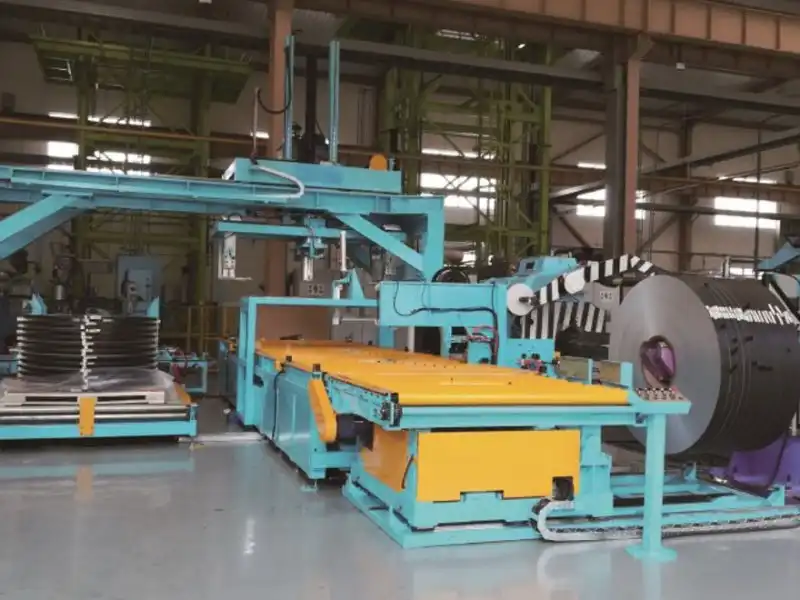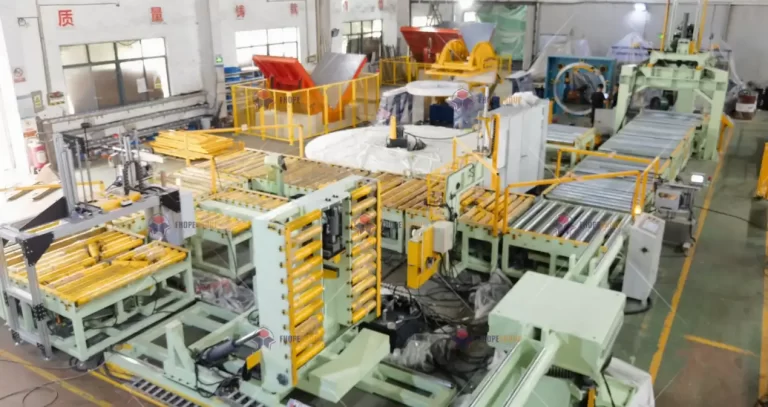When investing in an automated steel packing line, negotiating a comprehensive and well-structured contract is crucial for ensuring a successful long-term partnership with your equipment supplier. A properly negotiated contract not only protects your interests but also sets the foundation for a smooth implementation and operation of your coil packing system. In this article, we will explore the key negotiation points to consider when drafting your steel coil packing line contract, helping you navigate the process with confidence and transparency.
Heading 1: Defining the Scope of Work and Deliverables
One of the most critical aspects of your steel coil packing line contract is clearly defining the scope of work and deliverables. This section should outline the specific equipment, services, and responsibilities of both parties involved. Consider the following points:
- Detailed Equipment Specifications: The contract should include a comprehensive list of the equipment and components to be provided by the supplier. This should cover the automated steel packing line itself, as well as any ancillary equipment, such as conveyors, wrapping machines, or strapping units. Be sure to specify the make, model, and technical specifications of each item to avoid any ambiguity.
- System Integration and Compatibility: Clearly define the supplier's responsibilities in terms of integrating the packing line with your existing systems and infrastructure. This may include integration with your warehouse management system (WMS), conveyor systems, or other production equipment. Ensure that the contract specifies the necessary interfaces, protocols, and compatibility requirements to guarantee seamless integration.
- Customization and Modifications: If your steel coil packing line requires any customization or modifications to meet your specific needs, these should be explicitly outlined in the contract. Clearly describe the desired changes, including any special features, functionalities, or performance requirements. This will help avoid misunderstandings and ensure that the supplier delivers a system that aligns with your expectations.
- Documentation and Training: The contract should stipulate the documentation and training to be provided by the supplier. This may include operation manuals, maintenance guides, spare parts lists, and software documentation. Additionally, specify the extent and duration of training to be provided for your operators, maintenance personnel, and other relevant staff. Clearly define the supplier's responsibilities in terms of on-site or remote training support.
By thoroughly defining the scope of work and deliverables, you can ensure that both parties have a clear understanding of their obligations and minimize the risk of disputes or misinterpretations down the line.
Heading 2: Performance Guarantees and Acceptance Criteria
To ensure that your automated steel packing line meets your performance expectations, it is essential to include performance guarantees and acceptance criteria in your contract. These provisions outline the specific metrics and benchmarks that the system must achieve to be considered acceptable. Consider the following points:
- Throughput and Cycle Times: Specify the expected throughput and cycle times of the packing line. This may include the number of coils processed per hour, the speed of the conveyor system, or the time required for each packing stage. Clearly define how these metrics will be measured and verified during the acceptance testing phase.
- Packing Quality and Consistency: Define the acceptable level of packing quality and consistency. This may include parameters such as the tightness of the wrapping, the alignment of the coils, or the accuracy of the labeling. Establish clear quality control criteria and specify the methods for evaluating and reporting any deviations.
- Uptime and Reliability: Include provisions for minimum uptime and reliability requirements. This may involve specifying the acceptable level of downtime, the mean time between failures (MTBF), or the overall equipment effectiveness (OEE) targets. Clearly define the consequences and remedies in case the system fails to meet these performance guarantees.
- Acceptance Testing and Commissioning: Outline the procedures and timeline for acceptance testing and commissioning of the automated steel packing line. Specify the duration of the testing period, the criteria for successful completion, and the roles and responsibilities of both parties during this phase. Ensure that the contract includes provisions for addressing any issues or non-conformances identified during testing.
By incorporating well-defined performance guarantees and acceptance criteria, you can hold the supplier accountable for delivering a system that meets your specific requirements and expectations.

Heading 3: Warranty and Service Level Agreements (SLAs)
Style: Negotiable, Transparent
A robust warranty and well-defined service level agreements (SLAs) are essential components of your steel coil packing line contract. These provisions protect your investment and ensure that you receive prompt support and resolution in case of any issues or breakdowns. Consider the following points:
- Warranty Coverage and Duration: Clearly specify the warranty coverage and duration for the automated steel packing line and its components. This should include the scope of the warranty, such as parts, labor, and software, as well as any exclusions or limitations. Define the warranty period, which typically ranges from one to two years from the date of commissioning or acceptance.
- Response Time and Resolution Targets: Establish clear SLAs for the supplier's response time and resolution targets in case of system issues or breakdowns. This may include specifying the maximum acceptable response time for different levels of severity, such as critical, major, or minor incidents. Additionally, define the expected resolution time frames and the escalation procedures if the targets are not met.
- Spare Parts Availability and Delivery: Include provisions for spare parts availability and delivery to minimize downtime in case of component failures. Specify the supplier's obligations in terms of maintaining an adequate inventory of critical spare parts and the expected lead times for delivering these parts to your facility. Consider negotiating a consignment stock arrangement to ensure quick access to essential spares.
- Technical Support and Remote Diagnostics: Outline the supplier's responsibilities for providing technical support and remote diagnostics services. This may include specifying the availability of a dedicated support hotline, the qualifications of the support personnel, and the tools and technologies used for remote troubleshooting. Clearly define the escalation matrix and the expected response times for different levels of technical support.
By incorporating comprehensive warranty and SLA provisions, you can ensure that your automated steel packing line is adequately protected and that you receive prompt and effective support throughout the system's lifecycle.
Heading 4: Maintenance and Upgrade Provisions
Style: Negotiable, Transparent
To maximize the long-term performance and value of your steel coil packing line, it is crucial to include maintenance and upgrade provisions in your contract. These provisions outline the responsibilities and procedures for maintaining and enhancing the system over time. Consider the following points:
- Preventive Maintenance Schedule: Specify the requirements for a preventive maintenance schedule, including the frequency and scope of maintenance activities. Clearly define the roles and responsibilities of both parties in executing the maintenance plan. This may include specifying who will perform the maintenance tasks, the necessary qualifications of the maintenance personnel, and the documentation and reporting requirements.
- Software Updates and Upgrades: Include provisions for software updates and upgrades to ensure that your automated steel packing line remains up to date with the latest features and security patches. Specify the frequency and process for delivering and implementing these updates, as well as any associated costs or fees. Clearly define the compatibility requirements and the testing procedures to validate the updates before deployment.
- System Enhancements and Modifications: Establish a framework for future system enhancements and modifications to accommodate evolving business needs. This may include provisions for requesting and implementing custom features, integrating new technologies, or expanding the system's capabilities. Clearly define the process for scoping, quoting, and approving these enhancements, as well as the associated costs and timelines.
- Training and Knowledge Transfer: Include provisions for ongoing training and knowledge transfer to ensure that your personnel remain proficient in operating and maintaining the automated steel packing line. Specify the supplier's obligations in terms of providing refresher training, updating documentation, and sharing best practices. Consider negotiating a long-term training plan to support the continuous development of your workforce.
By incorporating robust maintenance and upgrade provisions, you can ensure that your steel coil packing line remains reliable, efficient, and adaptable to your evolving business requirements.
Heading 5: Payment Terms and Milestones
Style: Negotiable, Transparent
Negotiating favorable payment terms and milestones is essential for managing your cash flow and mitigating financial risks associated with the acquisition of your automated steel packing line. Consider the following points:
- Payment Schedule and Milestones: Establish a clear payment schedule that aligns with the project milestones and deliverables. This may include a down payment upon contract signing, progress payments based on specific milestones (such as design approval, equipment delivery, or commissioning), and a final payment upon successful acceptance testing. Ensure that the payment terms provide adequate protection and incentivize the supplier to meet the agreed-upon deadlines and quality standards.
- Retention and Performance Bonds: Consider including retention provisions or requiring performance bonds to safeguard your investment. A retention clause allows you to withhold a percentage of each progress payment until the system is successfully commissioned and accepted. Performance bonds provide financial protection in case the supplier fails to meet their contractual obligations. Clearly define the conditions for releasing the retention or claiming the performance bond.
- Late Payment and Dispute Resolution: Specify the consequences and remedies for late payments, including any applicable interest rates or penalties. Additionally, include provisions for dispute resolution, such as mediation or arbitration, to address any disagreements or conflicts that may arise during the project. Clearly define the procedures, timeframes, and responsible parties for resolving disputes in a timely and efficient manner.
- Currency and Exchange Rate Considerations: If the contract involves international transactions or multiple currencies, clearly specify the applicable currency and exchange rate provisions. This may include defining the base currency, the exchange rate reference date, and any mechanisms for adjusting the contract value in case of significant currency fluctuations. Ensure that the currency and exchange rate terms are fair and transparent to both parties.
By negotiating clear and favorable payment terms and milestones, you can ensure a smooth financial process and protect your interests throughout the acquisition and implementation of your automated steel packing line.
Conclusion
Negotiating a comprehensive and well-structured contract is a critical step in ensuring the success of your automated steel packing line investment. By carefully considering and addressing key negotiation points, such as the scope of work, performance guarantees, warranty and SLAs, maintenance and upgrade provisions, and payment terms, you can establish a strong foundation for a mutually beneficial partnership with your equipment supplier.
Throughout the negotiation process, it is essential to maintain a transparent and collaborative approach, focusing on finding solutions that align with the interests of both parties. By clearly defining expectations, responsibilities, and performance criteria, you can minimize the risk of misunderstandings and disputes, while maximizing the value and long-term success of your steel coil packing line.
Remember, a well-negotiated contract not only protects your investment but also sets the stage for a smooth implementation, efficient operation, and continuous improvement of your packing line. By dedicating time and effort to the negotiation process and seeking expert guidance when necessary, you can ensure that your automated steel packing line contract serves as a robust framework for a successful and lasting partnership with your equipment supplier.






